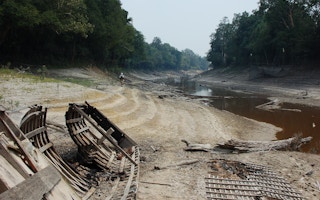Vulnerability to extremes of heat has risen in every region of the world. In 2017, an additional 157 million people were exposed to heatwave events, compared with 2000. That means that the average person now experiences 1.4 additional days of heatwaves per year.
This enervating exposure to extended extremes of heat imposes a global cost. National economies—and household budgets—lost 153 billion hours of labour in 2017, because of sweltering days and torrid nights: this is an increase of 62 billion working hours—more than three billion working weeks—since the turn of the century.
The rise in extremes of heat means that more people than ever are potentially at risk of heatwave-related conditions: among them heat stress, cardiovascular illness and kidney disease.
That increasing extremes of heat, driven by ever greater levels of greenhouse gas emissions that fuel global warming and climate change, are a health hazard is now well established.
“
Trends in the impacts of climate change, exposures and vulnerabilities show unacceptably high risk for human health now and in the future.
Hillary Graham, study co-author, University of York, United Kingdom
More fatalities
Researchers have repeatedly warned that any increase in global average temperatures will be measured in more frequent, more intense and more extended extremes of heat and in some cases extreme humidity that will in turn claim ever greater numbers of lives.
Scientists have established that, by 2100, around three-quarters of humanity will face episodes of heat extremes, which can kill in any one of 27 different ways.
So the latest detailed study, in the journal The Lancet, brings wider focus and greater authority: it draws from scientists and public health professionals in 27 institutions and tracks 421 indicators across five areas, including climate change vulnerability; adaptation and planning for health; mitigation actions and the benefits these may have; finance and economics; and public and political engagement.
Among the indicators selected were weather-related disasters, food security, clean fuel use, meat consumption, air pollution, and scientific publications on climate and health. And although the report echoes the general alarms voiced in earlier studies, it takes a closer look at the details of human vulnerability to extremes of heat.
One finding is that people in Europe and the eastern Mediterranean may be more vulnerable than people living in Africa and Southeast Asia, if only because more than four out of 10 people in Europe and the eastern Mediterranean are aged over 65, compared with 38 per cent in Africa and 34 per cent in southeast Asia.
Hotter weather means more infectious disease: in 2016 alone, what the researchers call the “global vectorial capacity”—in other words, the spread of potentially disease-transmitting mosquitoes—of the dengue fever virus was the highest on record.
In the Baltic region, the coastline area vulnerable to an epidemic of the cholera bacterium grew by 24 per cent. In the highlands of sub-Saharan Africa, the area potentially at risk from malaria rose by more than 26 per cent.
And as the thermometer went up, more than 30 countries reported downward trends in agricultural yields. Agriculture is the field most directly hit by heat extremes, with 80 per cent of the labour losses, or 122 billion hours of work abandoned.
Huge losses
“Vulnerability to extreme heat has steadily increased around the world,” said Joacim Rocklöv, of Umea University in Sweden, one of the more than 70 scientists who put their names to the Lancet study.
“This has led to vast losses for national economies and household budgets. At a time when national health budgets and health services face a growing epidemic of lifestyle diseases, continued delay in unlocking the potential health benefits of climate change mitigation is shortsighted and damaging for human health.”
The report emphasises that heat extremes also intensify urban pollution: now 97 per cent of cities in low and middle-income countries no longer meet World Health Organisation air quality guidelines.
“Heat stress is hitting hard – particularly amongst the urban elderly, and those with underlying health conditions such as cardiovascular disease, diabetes or chronic kidney disease,” said Hugh Montgomery, co-chairman of the Lancet Countdown on health and climate change, who also directs the Institute for Human Health and Performance at University College London.
Risky outdoors
“In high temperatures, outdoor work, especially in agriculture, is hazardous. Areas from northern England and California to Australia are seeing savage fires with direct deaths, displacement and loss of housing as well as respiratory impacts from smoke inhalation.”
And Hilary Graham, of the University of York in the UK, another of the authors, warned that the way governments responded to climate change would shape the health of nations for centuries to come.
“Present-day changes in heat waves and labour capacity provide early warning of the compounded and overwhelming impact on public health that is expected if temperatures continue to rise,” she said.
“Trends in the impacts of climate change, exposures and vulnerabilities show unacceptably high risk for human health now and in the future.”
This story was published with permission from Climate News Network.










